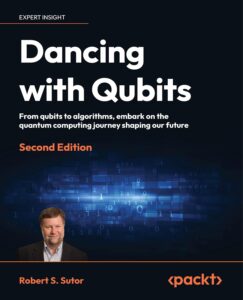From qubits to algorithms, embark on the quantum computing journey shaping our future
 Unlock the core math and understand the technical nuances of quantum computing in this detailed guide. Delve into the practicality of NISQ algorithms, and survey promising advancements in quantum machine learning.
Unlock the core math and understand the technical nuances of quantum computing in this detailed guide. Delve into the practicality of NISQ algorithms, and survey promising advancements in quantum machine learning.
Key Features
- Discover how quantum computing works and delve into the math behind it with practical examples
- Learn about and assess the most up-to-date quantum computing topics, including quantum machine learning
- Explore the inner workings of existing quantum computing technologies to understand how they may perform significantly better than their classical counterparts
Book Description
Dancing with Qubits, Second Edition is a comprehensive quantum computing textbook that starts with an overview of why quantum computing is so different from classical computing and describes several industry use cases where it can have a major impact. A full description of classical computing and the mathematical underpinnings of quantum computing follows, helping you better understand concepts such as superposition, entanglement, and interference. Next up are circuits and algorithms, both basic and sophisticated, as well as a survey of the physics and engineering ideas behind how quantum computing hardware is built. Finally, the book looks to the future and gives you guidance on understanding how further developments may affect you.
This new edition is updated throughout with more than 100 new exercises and includes new chapters on NISQ algorithms and quantum machine learning.
Understanding quantum computing requires a lot of math, and this book doesn’t shy away from the necessary math concepts you’ll need. Each topic is explained thoroughly and with helpful examples, leaving you with a solid foundation of knowledge in quantum computing that will help you pursue and leverage quantum-led technologies.
What You Will Learn
- Explore the mathematical foundations of quantum computing
- Discover the complex, mind-bending concepts that underpin quantum systems
- Understand the key ideas behind classical and quantum computing
- Refresh and extend your grasp of essential mathematics, computing, and quantum theory
- Examine a detailed overview of qubits and quantum circuits
- Dive into quantum algorithms such as Grover’s search, Deutsch-Jozsa, Simon’s, and Shor’s
- Explore the main applications of quantum computing in the fields of scientific computing, AI, and elsewhere
Who This Book Is For
Dancing with Qubits, Second Edition is a quantum computing textbook for all who want to understand and explore the inner workings of quantum computing. This entails building up from basic to some sophisticated mathematics and is therefore best suited for those with a healthy interest in mathematics, physics, engineering, or computer science.
Table of Contents
- Why Quantum Computing
- They’re Not Old, They’re Classics
- More Numbers than You Can Imagine
- Planes and Circles and Spheres, Oh My
- Dimensions
- What Do You Mean “Probably”?
- One Qubit
- Two Qubits, Three
- Wiring Up the Circuits
- From Circuits to Algorithms
- Getting Physical
- Considering NISQ Algorithms
- Introduction to Quantum Machine Learning
- Questions about the Future
Corrections
If your book was produced after the one with the listed Production Reference number, it may already include the corrections. Also, a correction may apply to the printed book, the corresponding PDF, or the Kindle book, or all three.
| Production Reference | Section | Page (PDF and Printed) | Original Text | New Text |
| 1250324 | 1.4 | 15 | The plot in Figure 1.9 is an example of a line separating the dark gray points below from the light gray ones above. | The plot in Figure 1.9 is an example of a line separating the dark gray points above from the light gray ones below. |
| 1250324 | 3.2 | 63 | The definition means that $w^1=1$. | The definition means that $w^1=w$. |
| 1250324 | 3.5.3 | 86 | The binary expansion of the decimal 5.125 is ${110.001}_2$, for example. | The binary expansion of the decimal 5.125 is ${101.001}_2$, for example. |
| 1250324 | 3.5.4 | 91 | We can approximate r as closely as we wish by computing a divergent … | We can approximate r as closely as we wish by computing a convergent … |
| 1250324 | 3.9.3 | 105 | $e^{\pi i} = -1$ or $e^{\pi i} – 1 = 0$ | $e^{\pi i} = -1$ or $e^{\pi i} + 1 = 0$ |
| 1250324 | 5.2 | 150 | comprising $\mathbf{v}_1 = \mathbf{e}_1$ | comprising $\mathbf{x}_1 = \mathbf{e}_1$ |
| 1250324 | 5.5.1 | 147 | Now that we can add, subtract, and invert matrices | Now that we can add, subtract, and negate matrices |
| 1250324 | 5.6 | 186 | For an n-by-n> matrix A | For an n-by-n matrix A |
| 1250324 | 5.10 | 211 | The diagonal entries are none other than the eigenvalues with the orthonormal basis as eigenvalues. |
The diagonal entries are none other than the eigenvalues with the orthonormal basis as eigenvectors. |
| 1250324 | 7.2 | 252 | $${\left| {v} \middle> \middle< {w} \right|} = \begin{bmatrix} 3(2 – i) & 3 \times 4 \\ i(2 – i) & i \times 4 \end{bmatrix} = \begin{bmatrix} 6 – 3i & 12 \\ 1 + 2i & 4i \end{bmatrix}$$ |
$${\left| {v} \middle> \middle< {w} \right|} = \begin{bmatrix} 3(2 – i) & 3 \times 4 \\ -i(2 – i) & -i \times 4 \end{bmatrix} = \begin{bmatrix} 6 – 3i & 12 \\ 1 – 2i & -4i \end{bmatrix}$$ |
| 1250324 | 7.3.1 | 257 | is a quantum state, we know that ‖ψ‖ = ⟨ψ|ψ⟩ = |a|2 + |b|2 = 1. | is a quantum state, we know that ‖ψ‖2 = ⟨ψ|ψ⟩ = |a|2 + |b|2 = 1. |
| 1250324 | 8.1 | 303 |
The process of tensoring with more copies of C2 is exponential in the number of dimensions.
|
The process of tensoring with more copies of C2 is exponential in the number of copies. |

